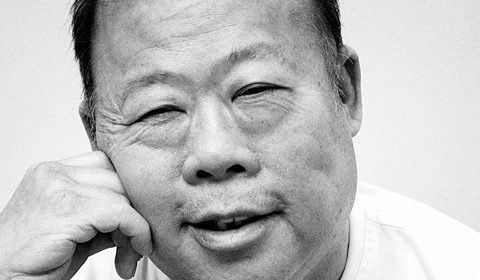
We Grill: Harry Yeung
Multi award-winning Cantonese master chef Harry Yeung MBE is one of the most celebrated Chinese chefs in the UK. He began his culinary apprenticeship in the kitchens of Hong Kong and now runs Manchester’s Yang Sing, one of the country’s most famed Cantonese restaurants.
Harry re-interprets Cantonese classics for a contemporary audience, whilst keeping an eye on honouring the traditions and techniques of the old masters. Harry’s cooking has attracted diners including David Cameron, Sir Alex Ferguson and Sir Andrew Lloyd-Webber.
Why did you become a chef?
I started to help out in the kitchen as a young boy, aged just 13 in Hong Kong, because I needed to contribute to the family income. I was the eldest son in the family and in those days life was hard. The communists had taken over China and my family and I moved to Hong Kong and then later to England.
What was the first restaurant you worked in and how did you embrace cooking?
Officially, it was San Ho, in Manchester under my father and uncle when we came over to England in 1970 and I was 17. I worked hard and missed out on school. My father was a tough nut but I enjoyed it in the kitchen alongside the other boys; it became like a second family. I loved food. There wasn’t much choice in the matter, but it was the right thing to do and step up and take the mantle when my dad fell ill. But no regrets – I was meant to be a chef.
What would you liked to have been if you weren’t a chef?
Easy, a footballer! I was a good player, I’m better on the sideline now though. I have a few of my own ideas about how to run United.
Why, and when did you get your MBE?
It was presented to me by Prince Charles in 2004 for services to food. Buckingham Palace is a beautiful place and I felt very honoured.
What has been the highlight of your career or what are you most proud of?
Our restaurant Yang Sing was the first ‘ethnic’ restaurant to receive the Pestle and Mortar back in 1983. It meant we served the best food in the UK. A Chinese restaurant had never been recognised in this way before, and the Good Food Guide chose us. That and serving Sir Alex of course: that’s up there.
What’s your favourite dish on the menu and why?
Steamed wild turbot in ginger and spring onions with simple, boiled rice. It has to be fresh, the fish has to be wild not farmed. Less is more.
Does the menu change seasonally and what ingredients are you looking forward to using in January and February?
Of course, fresh seasonal ingredients are important. For example I change the fillings of our vegetable dumplings throughout the year according to the seasons and what’s market fresh. January and February are great months for root vegetables and a time of big family feasts for us as it is Chinese New Year. In the New Year banquet menu seasonal produce plays a big part along with family favourites like Cantonese duck and suckling pig.
What hobbies/interests do you have outside the kitchen?
Manchester United! I never miss a game, it’s the only thing that tears me away from the kitchen. I also recently became a grandfather too.
Earliest food memory
At 13-years-old, in the kitchen with my Dad as an apprentice.
Favourite restaurant in the UK?
My own. I’ve eaten almost all my meals here for nearly 40 years and I’m still not bored.
What do you think makes your restaurant a success?
Without a doubt the food: it’s what we’re known for. But also it’s my family. My father was a chef before me and my children will be after me, so the restaurant is in good hands. Our customers also make it a success, and we have some that started coming when we first opened in the 70s.
What specific skills, ingredients and equipment do you need to cook Cantonese?
Good hands, fresh, seasonal produce, a wok and a good burner. Good gas!
What’s the biggest mistake chefs make when trying to cook Cantonese food? What tips do you have for a chef who wants to cook Cantonese for the first time?
Overcooking the food. With wok cooking you need to concentrate, pay attention, don’t overcook or undercook the food. Keep your ingredients real and fresh with good textures. Don’t overthink it: less is more.

